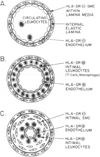Inflammation in atherosclerosis
- PMID: 22895665
- PMCID: PMC3422754
- DOI: 10.1161/ATVBAHA.108.179705
Inflammation in atherosclerosis
Abstract
Experimental work has elucidated molecular and cellular pathways of inflammation that promote atherosclerosis. Unraveling the roles of cytokines as inflammatory messengers provided a mechanism whereby risk factors for atherosclerosis can alter arterial biology, and produce a systemic milieu that favors atherothrombotic events. The discovery of the immune basis of allograft arteriosclerosis demonstrated that inflammation per se can drive arterial hyperplasia, even in the absence of traditional risk factors. Inflammation regulates aspects of plaque biology that trigger the thrombotic complications of atherosclerosis. Translation of these discoveries to humans has enabled both novel mechanistic insights and practical clinical advances.
Figures



References
-
- Ross R, Glomset JA. The pathogenesis of atherosclerosis I. New England Journal of Medicine. 1976;295(7):369–377. - PubMed
-
- Ross R, Glomset JA. The pathogenesis of atherosclerosis II. New England Journal of Medicine. 1976;295(8):420–425. - PubMed
-
- Virchow R. Cellular Pathology. London: John Churchill; 1858.
-
- Karnovsky ML. Metchnikoff in Messina: a century of studies on phagocytosis. N Engl J Med. 1981;304(19):1178–1180. - PubMed
-
- Aqel NM, Ball RY, Waldmann H, Mitchinson MJ. Identification of macrophages and smooth muscle cells in human atherosclerosis using monoclonal antibodies. J Pathol. 1985;146:197–204. - PubMed
Publication types
MeSH terms
Substances
Grants and funding
LinkOut - more resources
Full Text Sources
Other Literature Sources
Medical

